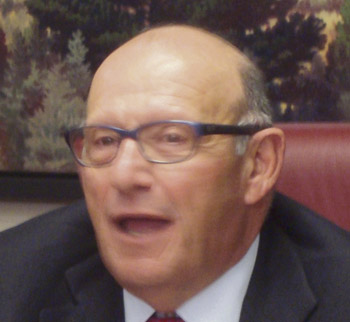Back when he was a young lawyer, Ed Sonshine was labouring away on a file when the firm’s senior partner came into his office and dragooned him to an emergency fundraising event.
It was October 1973 and the Yom Kippur War was raging. Taken to the home of a prominent Jewish lawyer, Sonshine found himself among a group of 100 to 125 “giants of the Jewish bar.” They rose one after the other to pledge large amounts to support Israel.
His boss, Lloyd Fogler, prodded him to get up and make a pledge, but as a junior lawyer watching others pledge more than he earned “pre-tax,” he was a little nervous about doing so.
Finally he stood and pledged $1,000. His colleague applauded, and when he returned home to tell his wife, Fran, to his delight, she supported him completely.
That unexpected incident propelled him into the world of philanthropy, which saw him participate in the United Jewish Appeal’s lawyers division and eventually co-chair its annual campaign. It didn’t hurt his business either, Sonshine, who currently serves as CEO of RioCan Real Estate Investment Trust (REIT), confided at a meeting of the young leadership division of the Canadian Society for Yad Vashem.
While involvement in charitable organizations can be time-consuming, there are plenty of upsides in addition to assisting a worthy cause, he said.
“One of the most interesting things about the year I was UJA [Federation of Greater Toronto] chair was I got to meet some of the most interesting people in Toronto.” Many he did not know, but his involvement was very good for networking, Sonshine stated.
“Doing good” is never a bad idea, he continued. “There are enough people in our community who respect that.
“People respect you for working for Yad Vashem,” he added.
In discussing the intersection of philanthropy and business, Sonshine suggested there may be something larger at play. Businessman Larry Tanenbaum approached him to chair the annual UJA campaign. He was hesitant, he said, because it was “very busy at RioCan.”
Tanenbaum told him, “The more work I do for the community, I do better.”
With that advice in mind, Sonshine took the position with UJA. RioCan did well notwithstanding the time he spent on the campaign.
“Maybe it makes you a better person. I don’t know,” he said.
Describing his journey to the corner office of Canada’s largest real estate investment trusts, Sonshine pointed out he actually began his career as a lawyer.
Sonshine joined a Jewish firm – the large downtown ones hired few Jews at the time, he said, but by 1986 he was looking for something different. He left law to join Counsel Corporation to run its real estate arm.
In 1989 “the real estate world fell apart pretty dramatically and quickly.” Sonshine realized that a real estate mutual fund owned by Counsel relied on a model that did not work – it was impossible to honour a 30-day redemption when the underlying assets were illiquid.
He had studied REITs, which were available in the United States, and in 1994 he created RioCan REIT. As an investment trust, rent generated by properties are paid back to the firm’s unit holders, who have the expectation of stable returns that increase over time.
That model proved a success. “We were in the right place at the right time with the right vehicle,” said Sonshine.
RioCan is now Canada’s largest REIT with assets worth around $10 billion.
It owns neighbourhood shopping centres anchored by supermarkets, together with a mix of retail centres, the company states on its website. It currently has more than 60 million square feet in its portfolio, including interests in a number of grocery-anchored shopping centres in the United States.
In October 2009, RioCan obtained its first U.S. property. It now manages six million square feet south of the border, concentrated in Pennsylvania, New York and Massachusetts. It has also ventured into Texas, which, with 26 million people, has an economy about the size of Canada’s, Sonshine said.
In a question period following his address, Sonshine was asked whether opportunities still exist for the younger generation.
“Every young person asks the same question,” he said. In the early 1970s, an architect friend of his, pointing to the many buildings in Toronto, wondered if there’d be anything for him to build.
That person is now a successful architect, Sonshine said.
“You never know. Who knew back then that I’d be running this big thing called a REIT? It didn’t exist,” he said.
“There will be no shortage of great opportunities,” he added. “There always are.”
* * *
Prior to his address, Sonshine was introduced by his wife, Fran, who serves as national chair of Canadian Yad Vashem.
She pointed out that Yad Vashem, which is Israel’s national Holocaust remembrance authority in Jerusalem, brings 20 to 25 Canadian educators to the facility each summer, the majority of them not Jewish.
They learn about the Holocaust and are given instruction in how best to teach it. They bring a message about the dangers of intolerance and the relevance of the Holocaust today, she said.
Yad Vashem’s annual activities in Canada include organizing Yom Hashoah events; leading the National Holocaust Remembrance Day Ceremony in Ottawa; organizing the Holocaust Survivors’ Queen’s Park Award Ceremony as well as the Toronto Earl Bales Park Ceremony; hosting conferences to present curriculum materials to educators, and twinning bar and bat mitzvah kids with a child Holocaust victim.
Both she and her husband are the children of Holocaust survivors. Ed was born in the Bergen-Belsen displaced persons camp after the war; Fran was born on Cyprus in a British internment camp.
Both families ended up in Toronto where “they built a life,” Ed said.
